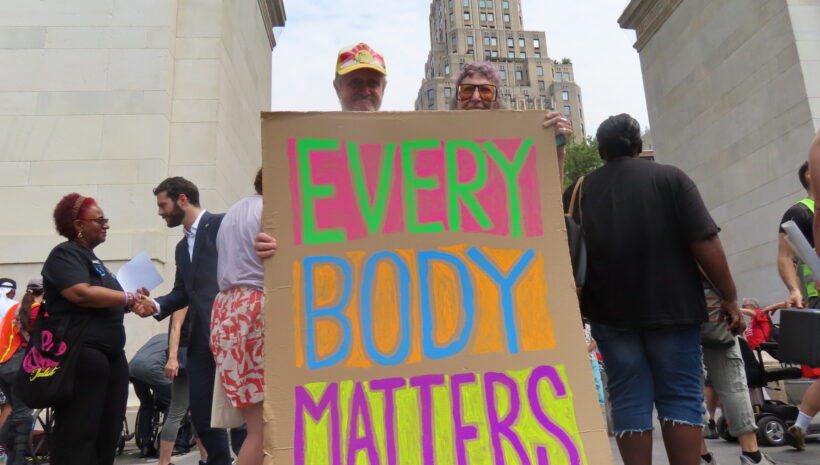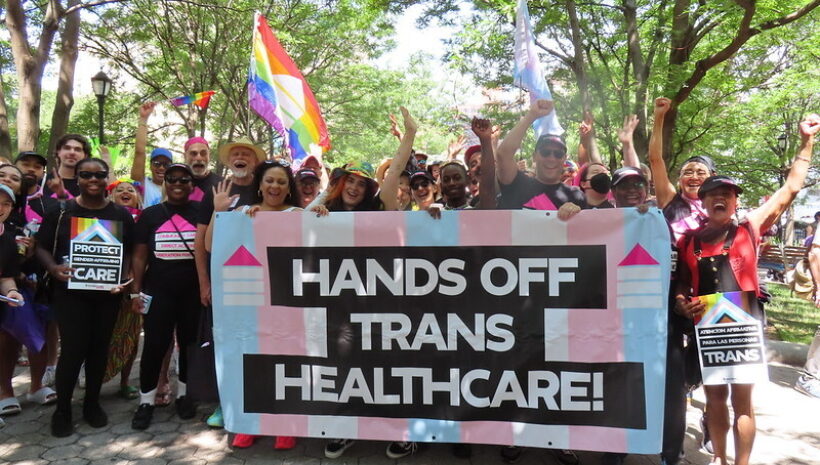For this Ask An Advocate entry, our Winter '21-22 intern, Xiuyan Piao, interviewed our fantastic city organizer, Valerie Reyes-Jimenez.
X: I watched your speech at the UN where you spoke about your life experience as an HIV+ woman and housing rights activist. I developed some questions from that. My first question is: what department do you work for?
V: I work with the Advocacy department, where I am the NYC community organizer.
X: What is your role and what is the goal for this department?
V: What I tell people is it’s my job to make things happen! Whatever it is, I make it happen and get people to go to that thing. It could be anything from getting people to go to a meeting, a rally, a demo, attending an event outside the city or anything. I try to get people from not knowing about an issue to knowing about it, and then I get them to go to an action for it.
X: Can you share your experience of finding housing? How has that affected your life?
V: My experience was a little different because it happened so long ago. Housing now compared to 1992 is very different. Back then, it was like the beginning of the COVID pandemic: people were dying everywhere and all at once. There were a great number of homeless people then, but now it’s even higher. The housing stock would turn around faster. People would come in, get sick, and die and someone else would come take that apartment. It was like a revolving door, because people weren't living as long.
I came to Housing Works in August of 1991. Within months I was housed, and I’ve been housed ever since. I came with a family. I had a husband at the time and two kids who were really small. My son was 3 and my daughter was 8. Now my daughter is almost forty!
X: So you’ve been working with Housing Works for thirty years?
V: Yes. Full-time for 7 years. Before that it was peer work, volunteer work, but I was still receiving public assistance and Medicaid. I wanted to raise my kids for whatever time I had left. I felt at the time that I was living on borrowed time.
X: Ideally, what should housing look like?
V: I believe there is not one type of housing people need, we need a variety of housing. A person with HIV is different from a person without HIV. What are their needs? What is their family composition like? It’s not just about blood family but family of choice. People don’t have to be married. Families are not just husband, wife, children. They are what they are. Depending on a person's ability and health, some people can be 100% independent and live on their own and be self-sufficient. On the other end of the spectrum, people could be in congregate housing where they have a studio apartment with a bathroom and kitchenette but have support groups, medical support, programs, all onsite. People could have mental health issues, substance use issues, and get the help they need as medically appropriate.
Sometimes, when we have a building designated like that, we can face a public response like “Oh, that’s where people with AIDS live.” That’s my one concern. But you also create a community with a sense of belonging. It’s important to be open minded for people who actively use substances, for example. We need to provide appropriate housing to the person who needs it. Not just one type.
X: Is there still stigma or stereotyping against people living with HIV? How can we change that?
V: Yes, there is still a stigma attached to being HIV+. And there is still stigma attached to the ways someone might acquire HIV, like having sex or using drugs. It’s not as scary for me as it was twenty years ago.
What creates stigma is fear, lack of knowledge. It makes the person who doesn’t know much about it uncomfortable. I think that being open and talking about it can really help. I found it helpful for myself.
Let’s say I’m going to speak in a classroom, I might ask how many people know someone living with HIV or who died from AIDS-related causes. At the end of the class they all have to raise their hand because I’ve talked to them about my situation and they know me.
Many people still don’t know how you can get HIV, or how you can prevent getting HIV. Today we know if someone is undetectable and the virus is in their body, there’s a slim chance they will pass it to another person. I’m a firm believer that everybody has an HIV status. If you’re negative, you should get the information you need to stay negative. If you’re positive, you should get the information you need to stay healthy and not have it go from your body to someone else’s body. It’s my responsibility, it begins and ends with me, but it’s also the negative person’s responsibility to do what they need to do to stay healthy. I think that idea can help with stigmatization.
X: Do you recommend any resources for people to learn more about HIV/AIDS?
V: That’s a really good question. A lot of the information I get nowadays is from the internet. I have to be very proactive. Do I go to Wikipedia or to the CDC? I would go to the CDC, state and city departments of health. There’s not one particular place I’d recommend, but we have forty years of information available. We have to weed out what’s hearsay versus what's fact. If you can’t ask a doctor about it, or you do and aren’t satisfied, I’d say to do your own research. I’d also say look for resources from people living with HIV to help learn and understand.
I found out I was HIV+ in 1989. I didn’t expect to still be alive or live this long. Even this morning I got up and felt I was tired, this hurts and this hurts, my hip is on fire and hurting and I think well, at least you’re old enough to have a bad hip now! That's a plus! I have the joy in this stuff, although it's very hard some days. But I’m satisfied with what I’ve been able to do with my life. Do I have regrets? Sure! But if I think about it and what I've been able to accomplish from then to now, I’m very satisfied.





